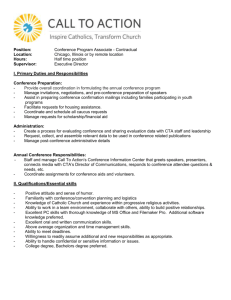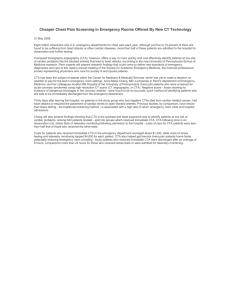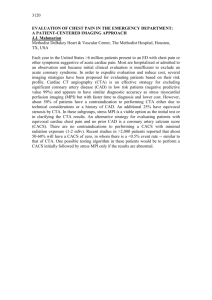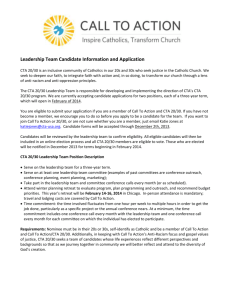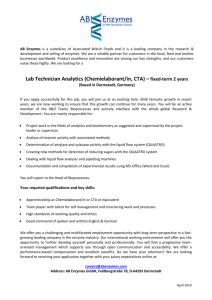3D Endoscopic View
advertisement
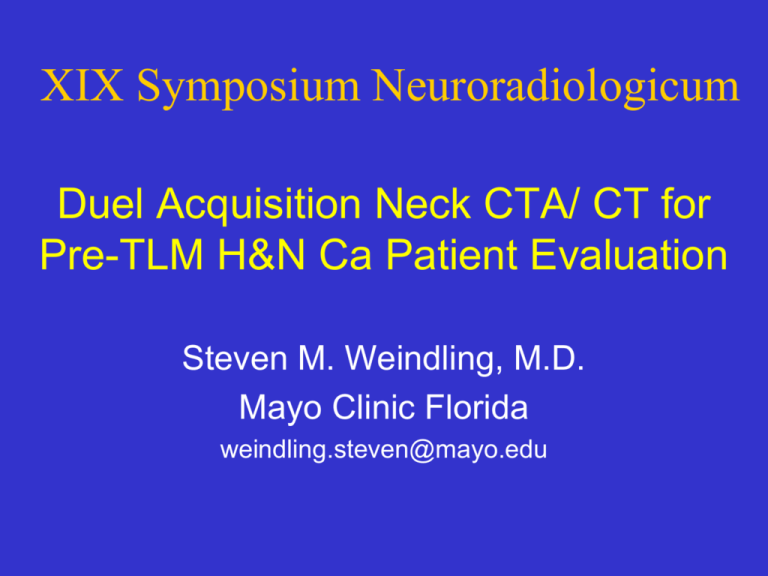
XIX Symposium Neuroradiologicum Duel Acquisition Neck CTA/ CT for Pre-TLM H&N Ca Patient Evaluation Steven M. Weindling, M.D. Mayo Clinic Florida weindling.steven@mayo.edu TLM Surgery: Background #1 • Transoral Laser Microsurgery (TLM) • Since 1996 TLM utilized increasing for resection of primary H&N cancers @ Mayo Clinic • CO2 Laser via transoral approach allows piecemeal tumor resection & “following the tumor” w/ frozen sections • May be performed in conjunction w/ standard neck nodal resection TLM Surgery: Background #2 TLM Advantages: • Excellent oncologic results: Local recurrence is uncommon w/ TLM TLM can be repeated for local tumor recurrence • Organ preservation: Improved functional outcome & faster recovery • Socioeconomics: Shortened hospital stay (3 days vs 7-8d for oropharynx T2 SCC) Single intervention for 75% of H&N Cancer patients • If second primary tumor occurs – All Tx options are available TLM Surgery: Background #3 TLM Disadvantages (Relative): • Lesion resection limited by line of site • Postoperative bleeding from arterial branch along inner margins of deeply invasive tumors – 701 TLM patients @ Mayo Clinic from 1996-2006 (Salassa, JR, Hinni ML, et al Otolaryngol Head Neck Surg; 2008; 139: 453-459) – 1.4% had post-op bleeding from TLM site – 3 Catastrophic bleeds (death or life threatening) Study Objective • Improve visualization of peritumoral arterial branches on pre-TLM patient imaging • Facilitate TLM patient selection • Assist surgeon w/ surgical planning → lower bleeding risk Duel Acquisition CTA/ CT: Technique • Subjects: Patients being considered for Transoral Laser Microsurgery (TLM) resection of primary H&N tumors • Extracranial CTA & enhanced ST Neck CT performed sequentially • 64 slice CT Scanner (Somatom Sensation; Siemans) Combined CTA/ CT: Contrast • 100 ml of Omnipaque 300 mg% (50 ml x 2) #1 #2 CTA Neck CT(+C) Begin CTA bolus tracking 0 sec 40 60 80 #1: 50 ml contrast followed by 30 ml NS @ 4cc/ sec #2: 50 ml contrast followed by 50 ml NS @ 4cc/ sec 90 Duel Acquisition CTA/ CT: Technique CTA Scan direction Caudo-cranial CT(+C) Cranio-caudal kVp 120 120 mAs 240 240 0.6 x 64 0.6 x 64 0.37 0.37 22 cm 22 cm Collimation Rotation time FOV Duel Acquisition CTA/ CT: Images Enhanced Neck CT: • Soft Tissue Axial 2 q 2 mm CTA: • Soft Tissue Axial 2 q 2 mm • Volume Rendered 3D – “Endoscopic Views”: Tumor & adjacent vessels (4cm slab) Patient Population • 20 patients w/ 1˚ H&N cancer in whom TLM resection was being considered by ENT surgeon • Primary Tumors: 19 SCC; 1 Adenoid Cystic Ca (oropharynx) • Primary Tumor Location & Stage: Oropharynx 12 (T2-8, T3-4) Oral tongue 3 (T3-3) Hypopharynx 3 (T2-3) Supraglottic Larynx 2 (T2-1, T3-1) Study Evaluation • Neck CTA vs. CT(+C) studies compared for: – Tumor & vessel enhancement (Ax. 2D images) – Tumor/ vessel relationships (Ax. 2D & 3D endoscopic images) • Clinical notes & operative reports reviewed to identify: – Patients in whom TLM surgical approach was altered or changed to conventional open surgery as a result of presurgical CTA-CT findings – TLM patients with perioperative bleeding Study Results • Peritumoral vessel enhancement: Superior on CTA in all but 1 patient (19/20) • Tumor enhancement (HU): CT(+C) > CTA: 12 patients CTA ≥ CT(+C): 8 patients • In 30% (6/20 patients) CTA-CT information led to a change in surgical approach: 4 - Neck dissection pre-TLM to ligate peritumoral artery 1 - Allowed surgeon to avoid aberrant thyroidal artery 1 - TLM ∆ to open surgery T2 SCC Hypopharynx – # 1 Aberrant Thyroidal artery along anterior tumor Lt. CT(+C) CTA 3D Endoscopic View T3 SCC Tongue Base– # 9 Tumor encased Lingual Artery ligated pre-TLM CT(+C) CTA CTA Cor. Recon. T3 SCC Tongue Base– # 9 Tumor encased Lingual Artery ligated pre-TLM 3D Endoscopic Views T3 SCC Oral Tongue – # 17 Tumor encased Lingual Artery ligated pre-TLM CT(+C) CTA 3D Endoscopic View T3 SCC Oropharynx – # 19 ECA & ICA Proximity → ∆ Open Surgery T CTA 3D Endoscopic Views Duel Acquisition Neck CTA/ CT for Pre-TLM H&N Ca Patient Evaluation Conclusions: 1. No instances perioperative bleeding among our TLM patients 2. Our TLM ENT surgeons like it: a. Facilitated TLM planning in all cases (esp. 3D images) b. Changed surgical approach in 30% of patients c. May also be used to facilitate Transoral Robotic Surgical (TORS) resection of H&N cancers 3. Benefits to Radiologist: a. Improved visualization of peritumoral vasculature (19/20) b. Tumor enhancement often best on CTA source images Thanks for your attention The End T3 SCC Oral Tongue – # 17 Tumor encased Lingual Artery ligated pre-TLM CT(+C) CTA CTA Cor. Recon. T3 SCC Oral Tongue – # 17 Lingual Artery Encasement Rt. 3D Endoscopic Views Critical Arterial Anatomy: Rt. Lat. Endoscopic Views Rt. T3 SCC Supraglottic Larynx – # 4 CT w CTA CTA Cor. Recon. T2 SCC Oropharynx – # 8 CT w CTA CTA Cor. Recon. T2 SCC Oropharynx – # 8 Rt. 3D Endoscopic View T3 SCC Oral Tongue – # 9 Lingual Artery Encasement Lt. CTA Sag. Recon. CTA Cor. Recon. Endoscopic view.
